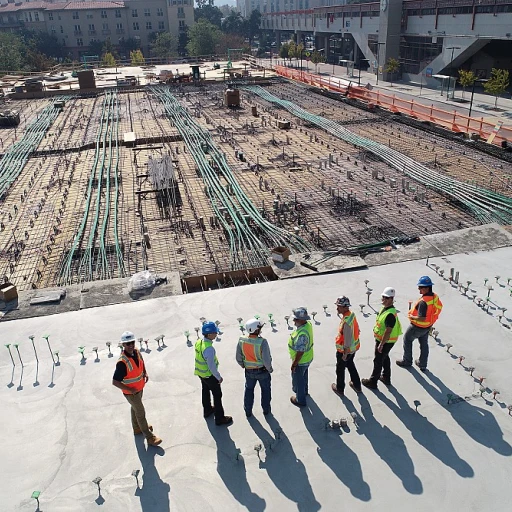
Understanding the Landscape of Indian Manufacturing
The Indian Manufacturing Landscape: A Complex Tapestry
India's manufacturing sector is a vital pillar of its economy, contributing significantly to GDP and employment. The landscape is vast and diverse, encompassing everything from textiles and automobiles to electronics and pharmaceuticals. This diversity presents unique challenges and opportunities for project management within the sector.
Understanding the intricacies of the Indian manufacturing industry is crucial for project managers aiming to enhance operational efficiency and drive successful project implementation. The sector is characterized by a blend of traditional practices and modern innovations, creating a dynamic environment where project managers must be adept at navigating both established and emerging trends.
Key Drivers and Challenges
Several factors drive the growth of manufacturing in India, including a robust supply chain network, a large domestic market, and government initiatives like 'Make in India'. However, project managers face challenges such as regulatory compliance, quality assurance, and the need for lean manufacturing practices to maintain competitiveness.
In this context, the role of project managers extends beyond mere oversight; it involves strategic planning, risk management, and fostering a culture of continuous improvement. Effective project management practices are essential to navigate these challenges and leverage opportunities for growth and development.
Strategic Importance of Project Management
Project management in the Indian manufacturing sector is not just about managing timelines and budgets. It involves aligning projects with the company's strategic objectives, ensuring that each project contributes to the overall business goals. This alignment is critical for achieving sustainable growth and maintaining a competitive edge in the global market.
As we delve deeper into the nuances of project management in Indian manufacturing, we will explore how technology, leadership, and team dynamics play pivotal roles in shaping successful outcomes. For those looking to elevate their career trajectories within this vibrant industry, understanding these elements is crucial. You can explore more about career growth opportunities in our detailed discussion on elevating career trajectories.
Key Challenges in Project Management
Addressing the Complexities of Indian Manufacturing
In the realm of Indian manufacturing, efficient project management is an integral component that influences overall success. However, this landscape is fraught with several challenges that can impede the seamless progress of projects.
- Dynamic Market Conditions: The Indian manufacturing sector often faces volatile market trends, demanding adaptability in project management. Navigating these fluctuations requires a strategic approach to project development and implementation.
- Resource Management: Managing resources efficiently remains a significant challenge. Ensuring optimal utilization in both human resources and material stock can lead to enhanced production processes.
- Quality Assurance: Maintaining consistent quality throughout the project lifecycle is crucial. Implementing lean manufacturing practices and rigorous quality control programs can aid in sustaining product standards.
- Supply Chain Complexities: The intricacies of supply chain management can challenge project timelines and increase costs. Integrating robust supply chain solutions ensures the timely delivery of materials and can significantly bolster operational efficiency.
- Technology Adoption: While technology offers numerous benefits, its widespread adoption in manufacturing projects poses challenges. Bridging the gap requires strategic training development programs for successful technology integration and process automation.
Understanding these hurdles is critical for project portfolio managers aiming to streamline their approaches and drive successful management practices. As these challenges are addressed, the ability of project managers to steer their projects toward successful outcomes is significantly enhanced.
Discover how office managers can rise through the ranks in our comprehensive guide on elevating career trajectories.
Case Study: Successful Project Management Strategies
Real-life Implementation that Drives Results
In the dynamic world of Indian manufacturing, a well-structured and executed project management strategy can distinguish success from mediocrity. Learning from real-world examples is an invaluable approach to understanding effective project management. Let's delve into a noteworthy case study that exemplifies excellence in this sphere. A prominent manufacturing company faced significant challenges with its supply chain management due to its expanding production lines. The complexities of integrating new products into existing systems required a comprehensive management project overhaul. The company adopted a lean manufacturing approach to address inefficiencies and optimize operational processes. Key steps in this transformation included:- Conducting Workshops and Training Development: To align all team members, the company initiated a rigorous training program. This ensured everyone from project managers to factory-floor workers understood lean principles and their roles in the streamlined process.
- Implementation of Quality Management Systems: By introducing robust quality control measures, the company improved product outcomes and minimized defects.
- Utilizing Technology for Data-Driven Decisions: Incorporating advanced software solutions for portfolio management allowed for better decision-making, transparency, and real-time tracking across the program portfolio.
Role of Technology in Enhancing Project Management
Leveraging Technological Advancements for Project Management Success
The integration of technology has become a cornerstone in refining project management within the Indian manufacturing sector. It’s not just about adopting new tools, but about weaving them seamlessly into the fabric of project execution, enhancing efficiencies, and ensuring the highest quality of production. Technological tools have facilitated the transition from traditional management practices to more dynamic and responsive systems. This shift is particularly critical in coordinating complex projects and managing extensive project portfolios.- Project Management Software: These are invaluable for improving visibility and control over various projects. By providing real-time data, they enable project managers and teams to make informed decisions swiftly.
- ERP Systems: Enterprise Resource Planning systems are instrumental in managing supply chain operations more effectively, ensuring that all facets from procurement to production align seamlessly.
- Lean Manufacturing Technologies: The incorporation of lean principles through technology has streamlined processes, minimized waste, and enhanced quality control measures. Companies are better equipped to respond to market demands with agility and precision.
- Quality Management Systems: Automated quality checks and balances embedded within the production process lead to enhanced product standards and customer satisfaction.
Leadership and Team Dynamics
Leadership and Team Responsibilities
In the competitive landscape of Indian manufacturing, effective leadership and team dynamics are crucial as they form the backbone of successful project management. The interplay between leaders and their teams can determine the trajectory of a project, impacting timelines, quality, and overall success. Understanding the cultural and organizational context is paramount, where a collaborative management approach fosters trust and respect.- Leadership's Role in Influencing Project Outcomes: Leadership within manufacturing companies in India bears the responsibility of steering projects towards completion while maintaining quality standards. Leaders adeptly handle diverse portfolios, aligning team efforts with broader organizational goals. By endorsing lean manufacturing practices, leaders prioritize operational efficiency and resource optimization, crucial for maintaining competitive advantage.
- Team Dynamics and Collaboration: Team dynamics significantly influence project management outcomes. Encouraging open communication, inclusive decision-making, and diverse perspectives contribute to a healthier project environment. Teams in Indian manufacturing settings benefit from training programs that focus on collaboration, conflict resolution, and process excellence, enhancing productivity and morale.
- Training and Development: Regular training and skills development empower teams, enabling them to manage complex projects proficiently. This aspect also incorporates the understanding of advanced management systems and methodologies tailored to address specific industry challenges.
- Addressing Challenges via Solid Leadership: By actively addressing difficulties such as supply chain disruptions and production delays, leaders can ensure continuity and smooth implementation of projects in manufacturing. Strategies learned from successful management cases guide future endeavors, safeguarding against pitfalls and enabling the effective management of project portfolios.
Future Trends in Project Management for Indian Manufacturing
Trends Shaping the Future of Project Management in Indian Manufacturing
Project management within the Indian manufacturing sphere is continuously evolving. As industries strive for greater efficiency, several key trends are emerging that promise to reshape project management processes.- Technological Advancement: The increased integration of technology in project management systems is a prominent trend. Advanced tools in production planning and lean manufacturing processes enhance operational efficiency, greatly benefiting project managers by streamlining communication and workflow.
- Emphasis on Training and Development: Building expertise through management training programs is gaining traction. Continuous development and training of project managers ensure the adoption of best practices while fostering innovation in management practices.
- Lean and Agile Approaches: The shift towards lean manufacturing is influencing project methodologies, prompting companies to incorporate lean and agile management strategies. These approaches lead to faster project implementation and better quality control, vital for maintaining a competitive edge.
- Global Supply Chain Integration: Indian manufacturers are increasingly integrating into global supply chains. This necessitates comprehensive project portfolio management to address the complex logistical and production challenges of cross-border operations.
- Focus on Sustainable Practices: With rising awareness about environmental impact, Indian companies are prioritizing sustainable project management approaches. This includes adopting processes that not only boost production efficiency but also reduce waste and energy consumption.












